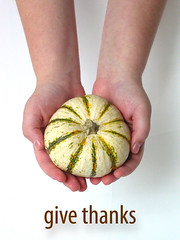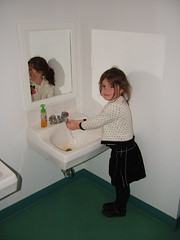
This year, I noticed the first signs around Labor Day when our local garden store - Max Is Back - displayed those large inflatable outdoor Christmas globes. Lowe's counteracted for a few days. Luckily, I was able to push it out of my mind.
October - normally Hallowe'en territory - was inundated with Yuletide stuff. And, forget about November! My 5 year old noticed and commented on it! Can you imagine? The youngest members of our society consider it strange! She said "Mama, why is there Christmas stuff out? It's not even Thanksgiving."
I'm not sure whether I feel validated or simply sad when I read others' commentaries on the subject. Brand Experience Lab's David Polinchock shares this rant about his town's decorations in Advertising Age - Christmas Marketing Creeps Backward Into October and refers to the 11/12/06 article from Ad Age Christmas comes but once a year-in October with subtitles "Christmas Marketing Creeps Backward Into October - Lowe's, Sears, Wal-Mart Rush the Season" by Mya Frazier. She states "..some consumers found themselves rooting through the Christmas candy to stock up for trick-or-treaters." Absurd!
Now, although I appreciate that Best Buy has been doing a lot of work to better connect with women consumers and that their October [Holiday] print ads were part of a "...new strategy to reach out to women shoppers better and understanding they start shopping earlier and never finish shopping", does that really mean having to be heavy-handed about Christmas? Aren't there more subtle ways to communicate with customers about product ideas and gift-giving concepts?
The 11/30/06 issue of The Seattle Times features this article titled Holiday retailers can't wait by Monica Soto Ouchi. It, too, offers examples of 'Christmas Creep' with Old Navy coming out with decorations before Hallowe'en, and Cost Plus before Labor Day. Ugh! It also shares some excellent stats. Despite all of this creep, it seems that consumers procrastinate more each year. Could it be that - like the beneficiaries of Elmo's every-day-is-Christmas-curse - consumers glaze over these almost desperate in-store holiday pleas???
George Whalin shares some interesting data from the National Retail Federation in Black Friday: The Battle for Consumer Dollars!: "14% of consumers begin their holiday shopping before September, 6.5% in September, and 19.9% in October." Nonetheless, does that really justify broadcasting 'Christmas' on LOUD starting as early as September? Or does it? Some consumers are constantly in shop-mode for Christmas, starting as soon as the current holiday is over. So perhaps we should indeed have Christmas every day!
Wouldn't consumers respond better to retail messages that were more clever, more varied, more season appropriate? That would certainly get my attention, and prevent me from tuning out. Of course, such an approach would go hand-in-hand with a merchandising mix unique to the store and a retail experience second to none! It would mean truly understanding and meeting the needs of consumers and providing stellar service [which The Seattle Times article suggests is what good retailers will be emphasizing]!
Retail Design Diva lists the Top 10 Retail Trends for the Holiday Season. Of those, I consider scent marketing fascinating. I'm noticing it more and more both in-store and in the news.
The other interesting trends are webbier and storemediaintegration. So far, everything I've purchased for the holidays [granted, not much, and purchased earlier in the year!] [and except for one-of-a-kind pottery from shows at the Art School at Old Church and especially the 32nd Annual Pottery Show, which showcases pottery by the country's most renowned potters] has been online because the in-store experiences have been lacking. I am so grateful to retailers with seamless web/store environments! My stress level immediately diminishes. It's fascinating to note which retailers use web/technology in-store to expand store selections and inventory. For example, Borders is offering more in-store web access, and Sears readily makes online ordering available for its Land's End products especially when items in-store are out-of-stock. Smart.
Isn't the end goal to make it so easy for a consumer that she will have no desire to go anywhere else? And, by not making it a matter of price wars [because your product/service are differentiated], margins benefit, too. Methinks Elmo would approve. Make the true Christmas Holiday season special in-store, and come up with different, creative ways to capture holiday magic at other times of the year. Right?
By the way, isn't it interesting that Nordstrom respects the traditional Friday-after-Thanksgiving time frame? Per the AdAge article, "Nordstrom is surprisingly subdued, and there's not a string of lights or evergreen to be found, yet it's packed as shppers flock to the luxury-department-store chain's half-yearly sale. The chain sticks to the after-Thanksgiving rule once uniformly obeyed across the retail industry and waits to even setup holiday decor until the day before Black Friday." Why am I not surprised?
Technorati Tags: retail experience, Christmas creep, marketing to women, creativity
[Disclaimer: my husband is a potter and affiliated with the Art School at Old Church. The school really does have unbelievably gorgeous pottery shows. And, the annual show is a don't miss opportunity to meet the best potters in the nation.]



















